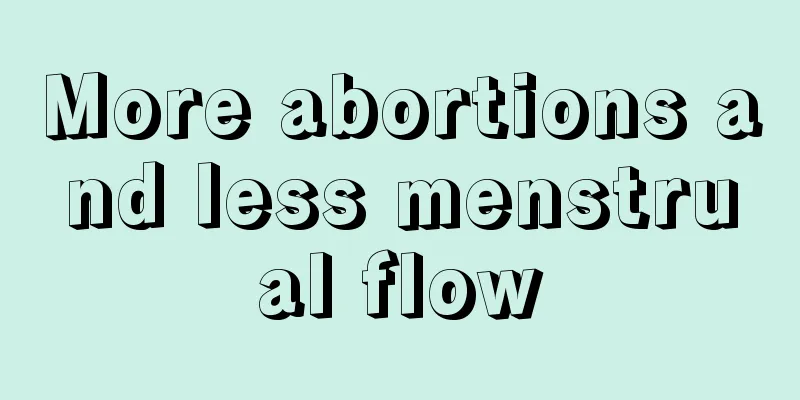Can I get pregnant right after my period?

|
Many people think that pregnancy will not occur right after the menstruation is over, so even if they have sex without taking protective measures during this period, it is still quite dangerous. Although the period right after the menstruation is called the safe period, it does not mean that pregnancy is completely impossible during this period. It is just a method of contraception. Therefore, even if you want to have sex during this period, you must take safety measures to avoid pregnancy. After the menstrual period is commonly known as the safe period. Normal women of childbearing age have one menstruation every month. From the beginning of this menstruation to the first day of the next menstruation is called a menstrual cycle. From the perspective of contraception, each menstrual cycle of a woman can be divided into the menstrual period, ovulation period and safe period. Safe period contraception is a contraceptive method that stops sexual intercourse during the ovulation period. A woman's ovulation date is generally about 14 days before the next menstrual period. After the egg is released from the ovary, it can survive in the fallopian tube for 1-2 days, waiting for fertilization; the male's sperm can maintain its fertilization ability in the female's reproductive tract for 2-3 days, so it is easy to get pregnant through sexual intercourse a few days before and after the egg is released. To be on the safe side, we call the 5 days before and 4 days after ovulation, together with the ovulation day, a total of 10 days, the ovulation period. Because it is easy to get pregnant through sexual intercourse during the ovulation period, the ovulation period is also called the fertile period or the dangerous period. The safe period is divided into the safe period before ovulation and the safe period after ovulation. The period from the end of menstruation to the day before ovulation is the safe period before ovulation. From the first day after the end of ovulation to the day before the next menstrual cramps is the safe period after ovulation. The safe period after ovulation is safer than the safe period before ovulation. This is because some women sometimes affected by environmental changes and mood swings affect the advance of the ovulation, so before the safe period ovulation will be shortened, but did not know their own, so before the safety period ovulation is not safe. The opportunity that the ovary has row two eggs in a menstrual cycle is very rare, that is, after ovulation to the next menstrual cramps before this period of time usually won't happen again the second time of ovulation, so the safety period after ovulation is relatively safe. The method of calculating the ovulation period based on the menstrual cycle is also called the calendar method. Both menstruation and ovulation are affected by endocrine hormones from the pituitary gland and ovaries and show cyclical changes. The length of their cycles is the same, both occurring once a month, and ovulation occurs between two menstrual periods. Generally speaking, the 3 days after menstruation and the 3 days before menstruation are absolutely safe periods. You will not get pregnant, even if you do not take any contraceptive measures. Don't worry. This is mainly because there is no ovulation at this time and the uterus does not have the conditions for implantation. There are also regulations on the time after the menstruation ends. Most of the time, the safest period is within 3 days after the menstruation ends. No protective measures are needed during this period because there are no conditions for implantation at this time. However, once this period has passed, protective measures must be taken, otherwise, artificial abortion after an unexpected pregnancy will cause great harm to the body. |
<<: What are the exercises for vaginal tightening?
>>: What to eat to treat menstruation?
Recommend
What should I do if I just got pregnant and had a chest X-ray?
It is best not to have a chest X-ray when you are...
Can pregnant women get eyebrow tattoos?
Beauty and skin care is a kind of life enjoyment ...
What are the precautions for eating hot pot? What is the trick to avoid getting irritated when eating hot pot?
You can use hot pot base to cook boiled beef, but...
Is it worth buying a damaged vehicle? What should you pay attention to when buying a damaged vehicle?
Many friends may find that there are many people ...
How long will it take to give birth if the water breaks at full term
When a pregnant woman is about to give birth, the...
Ibuprofen for menstrual pain
Menstrual pain is the discomfort in the lower abd...
Is it ovulation period when there is a lot of vaginal discharge?
Is the increase of leucorrhea a sign of ovulation...
What should women eat before pregnancy preparation?
At present, more and more couples are beginning t...
How long after childbirth can I replenish blood? Pay attention to the time
It is said that giving birth is like walking thro...
The harm of painless abortion to the uterus
Abortion is very harmful to the body. If you don&...
As long as the child does not have a fever, it does not mean he has pneumonia? Will eating unblanched spinach cause kidney failure? Here is the list of scientific rumors for December 2024
1. As long as the child does not have a fever, do...
A new drug for postpartum depression has taken a big step forward! What is so new about it?
After the new drug is launched, it can be expecte...
Pregnant women eating hawthorn may cause miscarriage? What prejudices do you have about hawthorn?
gossip In autumn and winter, there is a kind of f...
What is the reason for the growth of white hair in the pubic area?
Why does male pubic hair turn the skin white? We ...









